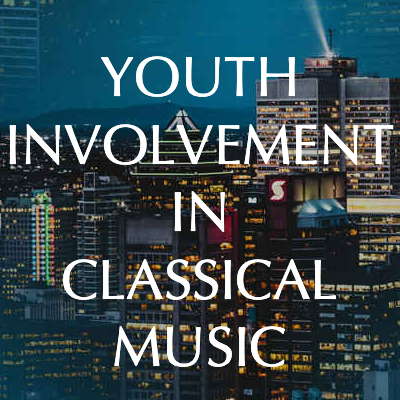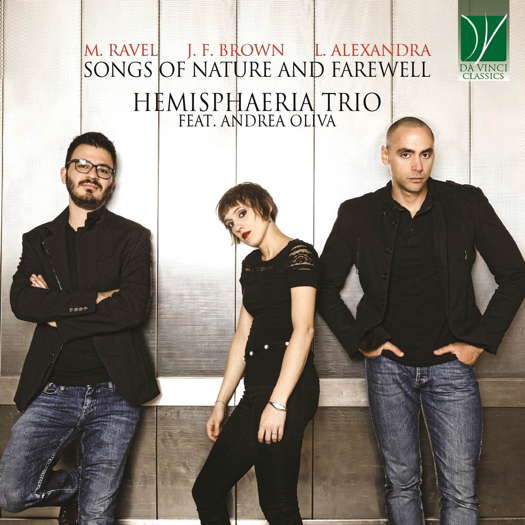 VIDEO PODCAST: John Dante Prevedini leads a discussion about Youth Involvement in Classical Music - this specially extended illustrated feature includes contributions from Christopher Morley, Gerald Fenech, Halida Dinova, Patricia Spencer and Roderic Dunnett.
VIDEO PODCAST: John Dante Prevedini leads a discussion about Youth Involvement in Classical Music - this specially extended illustrated feature includes contributions from Christopher Morley, Gerald Fenech, Halida Dinova, Patricia Spencer and Roderic Dunnett.

An Unusual Debut
GIUSEPPE PENNISI listens to music by Ravel, James Francis Brown and Liana Alexandra, performed by Andrea Oliva and the Hemisphaeria Trio
'... an innovative program by a very promising ensemble.'
This CD is unusual in various aspects. It is the recording debut of a new ensemble, a trio made up by a soprano (Damiana Mizzi), a cellist (Roberto Mansueto) and a pianist (Marcos Madrigal), integrated in some pieces with the flutist Andrea Oliva. The combination of the ensemble is quite original. A debut normally ploughs on quite well-known furrows such as pieces by composers often played and recorded. Instead, under the overall title Songs of Nature and Farewell, the CD includes two rarely performed, and – as far as I know - seldom recorded pieces by Maurice Ravel and the first recording of pieces by the British composer James Francis Brown and by the late Romanian composer Liana Alexandra.
The CD is produced by Da Vinci Publishing, headquartered in Osaka (Japan). Since 2015, this publishing house quickly developed a distinctive profile specializing in classical and jazz music. Since that time, the company has shown a remarkable development, becoming one of the most important and respected international benchmarks in the music world, publishing a high number of new CDs and scores each month. Its production embraces all periods from the twelfth century to the twenty-first but favours music never previously recorded or published, both in hard format and on digital platforms. The CD was presented in early August 2020 at a festival in Southern Italy.
Let us start with Maurice Ravel. The CD opens with Chansons Madécasses for soprano, flute, cello and piano. Also known as Madagascan Songs, this is a collection of three art songs written between 1925 and 1926 for voice (occasionally, in concert performances, a soprano or a mezzo is replaced by a baritone), flute, cello and piano with words from a poetry collection by the French eighteenth century poet Évariste de Parny. The song cycle consists of the three titles: 'Nahandove', 'Aoua' and 'Il est doux'. To the best of my knowledge, there is only a previous recording issued by Columbia in 1981, never produced on CD and quite difficult to find. It featured Frederica von Stade (mezzo-soprano), Doriot Anthony Dwyer (flute), Jules Eskind (cello) and Martin Katz (piano), which is an all-star cast.
During the years, I worked for the World Bank, I visited Madagascar several times, ate Malagasy food and listened to Malagasy music. I do not think that Ravel ever travelled to Madagascar, but in the first decades of the nineteenth century, in Paris there were several Malagasy restaurants where dinner was offered with musical entertainment. There is, no doubt, Malagasy flavour in the three songs, especially in 'Il est doux'.
Listen — Maurice Ravel: Il est doux (Chansons Madécasses)
(track 3, 0:45-1:42) © 2020 Da Vinci Classics :
Diana Mizzi is a dramatic soprano; a student of Mariella Devia and Renata Scotto, she features a very clear timbre. Quite good all the other elements of the ensemble.
In 2011, the quite popular British composer James Francis Brown wrote a work in three movements for the same instrumentation called Songs of Nature and Farewell, which is a setting of three little-known poems by the French composer Camille Saint-Saëns. The work was intended as a companion to Ravel's Chansons madécasses. As such, it is presented on the CD. The three poems are a pleasure to listen to. They are tonal, soft and delicate, as shown in 'La Libellule'.
Listen — James Francis Brown: La Libellule (Songs of Nature and Farewell)
(track 5, 0:01-0:55) © 2020 Da Vinci Classics :
Chant d’amour de la Dame à la Licorne by Liana Alexandra is a short chamber opera (less than twenty minutes) on a libretto by Etienne de Sadeleer based on a series of well-known fifteenth century Flemish tapestries. Although Liana Alexandra started her career with Darmstadt avant-garde, this 1995 composition is neoromantic. The soprano, the cello and the piano provide an excellent atmosphere, as can be felt in the final movement.
Listen — Liana Alexandra: Le toucher (Chant d’amour de la Dame à la Licorne)
(track 12, 0:14-1:04) © 2020 Da Vinci Classics :
The CD ends with La flûte enchantée by Ravel. A very short movement from Sherazade, composed in 1903 when the author was very young and fascinated by the exotic East. It is a good way to show the skills of the members of the ensemble.
Listen — Ravel: La flûte enchantée
(track 13, 1:52-2:51) © 2020 Da Vinci Classics :
In short, an innovative program by a very promising ensemble.
Copyright © 21 August 2020
Giuseppe Pennisi,
Rome, Italy

CD INFORMATION: SONGS OF NATURE AND FAREWELL
FURTHER INFORMATION: MAURICE RAVEL
FURTHER INFORMATION: LIANA ALEXANDRA
FURTHER INFORMATION: JAMES FRANCIS BROWN
FURTHER INFORMATION: DA VINCI CLASSICS




